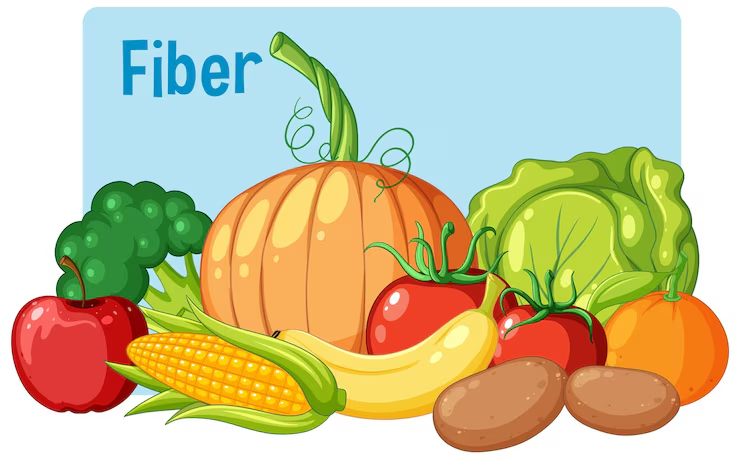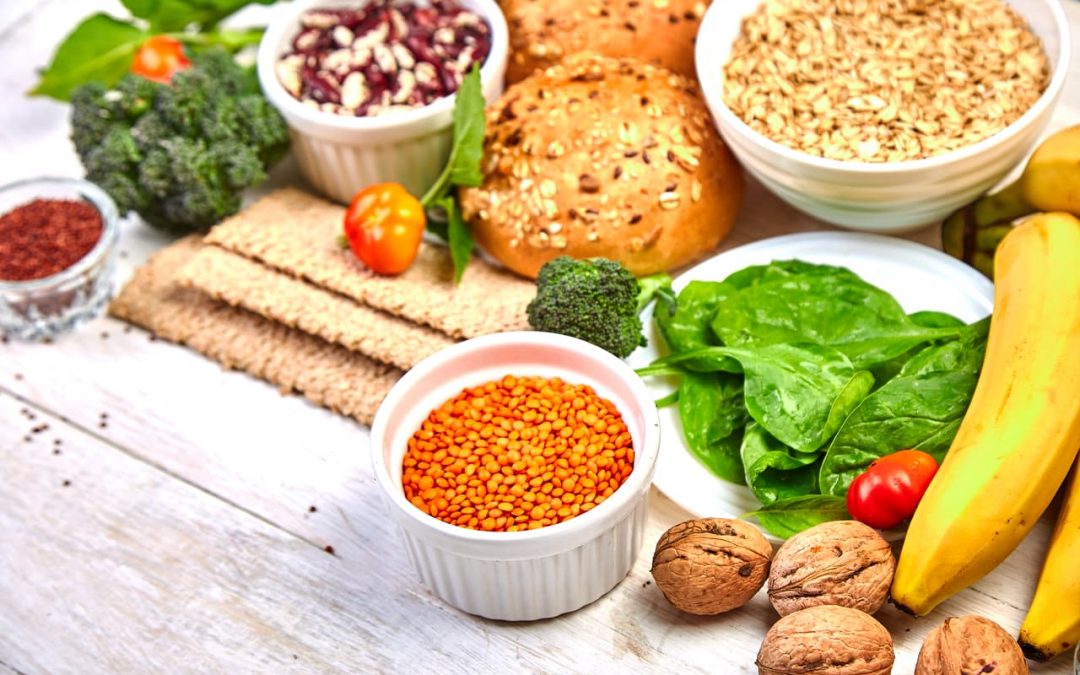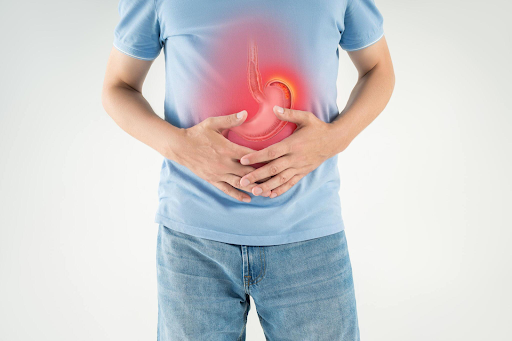Fiber is often forgotten in many weight loss plans, but it plays a very important role in keeping your gut healthy and helping you lose weight. Unlike other nutrients, fiber is not broken down by the body. Instead, it moves through your digestive system, supporting your overall health and helping you feel full longer, which can prevent overeating.
Fiber helps with weight loss by slowing digestion and controlling hunger. It also helps balance blood sugar and supports better digestion, which can improve how your body uses nutrients. Including fiber in your meals can lead to better weight management over time and reduce cravings between meals.
To get more fiber, eat foods like fruits, vegetables, whole grains, beans, and nuts. These are not only full of fiber but also packed with other nutrients your body needs. Making fiber a regular part of your daily meals can help you stay on track with your weight loss goals and support a healthier lifestyle overall.

Understanding Fiber: What Is It ?
- Types of Fiber
Fiber has two main types: soluble and insoluble. Both are important for your health, but they work in different ways. Soluble fiber helps with digestion and blood sugar, while insoluble fiber supports regular bowel movements and overall gut health.
Soluble Fiber: Soluble fiber dissolves in water and turns into a thick, gel-like substance in the digestive system. This process helps slow down digestion, which can lower cholesterol and keep blood sugar levels steady. Because it slows sugar absorption, it’s especially helpful for people managing blood sugar. Soluble fiber is commonly found in foods such as oats, beans, lentils, apples, oranges, and carrots. Including these in your meals can support heart health and better blood sugar control.
Insoluble Fiber: Insoluble fiber does not dissolve in water. Instead, it passes through your digestive system mostly unchanged, helping to move food through the gut more efficiently. This adds bulk to the stool and helps prevent constipation, supporting regular and healthy bowel movements. Insoluble fiber also helps keep the digestive system clean and functioning smoothly. You can find this type of fiber in foods like whole wheat products, wheat bran, nuts, seeds, and vegetables such as cauliflower, potatoes, and green beans.
- How Fiber Affects the Body
Fiber plays an important role in both digestion and overall body health. It helps keep the digestive system active and regular, which is essential for maintaining a healthy gut. Fiber also supports weight management by helping you feel full after eating, which can reduce cravings and prevent overeating. This is especially useful when trying to lose weight, as it allows you to eat satisfying meals without consuming too many calories. By adding more fiber-rich foods to your diet, you can improve digestion and make it easier to reach your weight loss goals.
The Science Behind Fiber and Weight Loss
- Fiber’s Impact on Appetite and Satiety
Fiber plays a key role in controlling appetite and making you feel full, which is essential for successful weight loss. Soluble fiber absorbs water in the stomach, forming a thick gel-like substance that expands and slows down digestion. This process helps you feel full for a longer time, reducing the urge to eat too soon after meals. Insoluble fiber, on the other hand, adds bulk to your food and also slows digestion, helping you stay satisfied for longer periods. Because fiber-rich foods take more time to chew and digest, they naturally encourage slower eating, which gives your body time to recognize fullness and can prevent overeating. Over time, this can lead to lower calorie intake without making you feel like you are missing out on food.
- Fiber and Blood Sugar Regulation
Fiber also plays an important role in keeping your blood sugar levels steady, which is very helpful for weight control. When you eat foods high in fiber, especially soluble fiber, they slow the absorption of sugar into your bloodstream. This prevents sudden spikes in blood sugar, which can lead to a rapid release of insulin. Insulin helps store sugar as fat, so keeping blood sugar steady helps your body avoid storing extra fat. Stable blood sugar also helps reduce cravings, emotional eating, and energy crashes that often lead to snacking. Eating more fiber can therefore help you manage hunger and energy levels throughout the day, making it easier to stick to a healthy eating plan.
- Fiber’s Role in Fat Burning
Fiber doesn’t just help control hunger—it may also play a part in how your body burns fat. Recent studies suggest that certain types of fiber help feed good bacteria in the gut, which are important for overall health and metabolism. A healthy gut environment can influence how your body stores and uses fat. When your gut bacteria are balanced, it can lead to better fat processing and increased energy use. This may improve your metabolic rate, making it easier for your body to burn fat more efficiently. By supporting gut health through fiber intake, you can indirectly help your body become better at losing weight and maintaining a healthy fat balance.
The Benefits of Fiber in Weight Loss

- Fiber and Calorie Control
One of the most effective ways fiber supports weight loss is by helping you manage your calorie intake naturally. High-fiber foods are often low in calories but high in volume, meaning you can eat more food without consuming too many calories. This is especially helpful for people trying to lose weight, as it allows for satisfying meals that don’t add up to a high calorie total. Fiber absorbs water and expands in your stomach, helping you feel full even with smaller amounts of food. For instance, vegetables like broccoli are rich in fiber but very low in calories, making them ideal for filling up your plate without risking weight gain. This fullness effect can reduce the need for second helpings or unhealthy snacks.
- Boosting Metabolism and Reducing Fat Storage
Fiber can also support weight loss by helping your body burn fat more efficiently and store less of it. By keeping blood sugar levels stable and improving the way your body responds to insulin, fiber helps prevent excess fat storage, especially around the belly area. When blood sugar spikes are avoided, your body releases less insulin—a hormone linked to fat storage. A diet high in fiber can help improve insulin sensitivity, meaning your body can use glucose more effectively without storing it as fat. Additionally, fiber supports the digestive system, and a well-functioning gut can help enhance how the body processes nutrients and burns calories, leading to a better metabolism overall.
- Preventing Overeating and Emotional Eating
Fiber is also helpful in preventing common eating habits that can sabotage weight loss, such as overeating and emotional eating. Because fiber slows digestion and keeps you feeling full, it helps you stay satisfied longer after meals. This reduces the temptation to reach for snacks or extra servings, especially during times of stress or boredom. Blood sugar crashes often trigger cravings for sugary or fatty foods, but fiber-rich meals help maintain steady energy levels and prevent these dips. In this way, fiber acts like a natural appetite controller. When included regularly in your diet, fiber can help you develop better eating habits, reduce emotional snacking, and maintain a healthier relationship with food.
How Much Fiber Do You Need ?
- Recommended Daily Fiber Intake
The recommended amount of fiber you should consume daily depends on factors like age, sex, and individual health needs. In general, adults should aim for about 38 grams of fiber per day if they are men under 50, and 25 grams per day if they are women under 50. As people age, their fiber needs typically decrease slightly. However, many individuals still fall short of these recommendations. To avoid digestive discomfort, health experts advise gradually increasing fiber intake, especially if you’re not used to eating fiber-rich foods. This can help your body adjust and reap the full benefits of fiber without causing bloating or discomfort.
- Signs of Fiber Deficiency
Not getting enough fiber can lead to several digestive issues. Common symptoms of fiber deficiency include constipation, bloating, and irregular bowel movements, which are signs that your digestive system isn’t working as efficiently as it should. Additionally, insufficient fiber intake can contribute to weight gain, as it may result in overeating or fluctuating blood sugar levels, which can cause hunger spikes. If you notice these symptoms, it’s important to evaluate your fiber intake and consider making dietary adjustments to ensure you’re getting enough fiber to support healthy digestion and weight management.
Best Sources of Fiber for Weight Loss

- Fruits and Vegetables
Fruits and vegetables are among the best sources of fiber and should be a staple in any diet. Berries, such as strawberries, blueberries, and raspberries, are particularly high in fiber and antioxidants. Apples and pears, with their skins, are also great choices, as are leafy greens like spinach, kale, and collard greens. These fiber-rich foods are not only low in calories but also packed with essential vitamins, minerals, and antioxidants. Including a variety of fruits and vegetables in your meals can help support weight loss, improve digestion, and provide a wealth of nutrients to maintain overall health.
- Whole Grains and Legumes
Whole grains are excellent sources of both soluble and insoluble fiber, which helps with digestion and keeps you feeling full. Foods like oats, quinoa, and brown rice provide substantial fiber while offering important nutrients such as vitamins and minerals. Legumes, including beans, lentils, and peas, are also high in fiber and offer the added benefit of being rich in protein. Protein helps to enhance satiety and curb hunger, making these foods ideal for weight management. Adding whole grains and legumes to your diet can significantly boost your fiber intake and promote a healthy digestive system.
- Nuts, Seeds, and Other Fiber-Rich Foods
Nuts and seeds are a great way to increase fiber in your diet while also providing healthy fats that are important for overall health. Almonds, chia seeds, flaxseeds, and sunflower seeds are excellent options. These foods are also rich in omega-3 fatty acids, which support heart health and reduce inflammation. Additionally, other fiber-rich foods such as avocados, sweet potatoes, and whole-wheat pasta provide a mix of fiber and essential nutrients. Incorporating these foods into your meals can help you meet your daily fiber needs while enjoying a variety of delicious, nutritious options.
How to Include More Fiber into Your Diet
- Simple Tips to Boost Fiber Intake
Increasing your fiber intake can be simple and enjoyable with a few easy adjustments to your daily meals. Here are some practical ways to boost your fiber consumption:
Start by adding beans or lentils to your meals. These fiber-rich legumes are great additions to salads, soups, and stews. They’re versatile, filling, and can enhance the texture and flavor of many dishes while increasing your fiber intake.
Swap out refined grains for whole grains, which offer more fiber and nutrients. Choose options like brown rice, quinoa, or whole-wheat bread instead of white rice, pasta, and white bread. These whole grains are not only healthier but also keep you feeling fuller for longer.
Instead of reaching for processed snacks, opt for fruits, vegetables, or nuts. These foods are naturally high in fiber and also provide essential vitamins and healthy fats. Keep some raw veggies or a handful of almonds on hand for an easy, satisfying snack.
Finally, kickstart your day with a fiber-packed breakfast. A bowl of oatmeal or a smoothie with added fruits and chia seeds is a great way to begin your morning. These foods are rich in fiber and can help keep you satisfied throughout the day.
- Fiber Supplements: Pros and Cons
While it’s ideal to get fiber from food, fiber supplements can be useful for those who have trouble meeting their daily fiber intake. However, it’s important to use them cautiously, as too much fiber can cause digestive issues like bloating and gas. Before adding fiber supplements to your diet, it’s a good idea to consult with a healthcare provider to ensure they’re right for your needs and won’t cause discomfort.
Common Myths About Fiber and Weight Loss
- Fiber Will Make You Gain Weight
A common misconception is that consuming fiber can lead to weight gain, mainly because fiber adds bulk to food. However, this is not the case. In fact, fiber plays a key role in weight management by helping to control hunger and reduce calorie intake. Fiber-rich foods are nutrient-dense, meaning they are packed with essential vitamins, minerals, and antioxidants but contain relatively few calories. This makes them ideal for weight loss, as they help you feel fuller without overloading your body with excess calories. So, rather than causing weight gain, fiber helps promote a healthy weight by supporting satiety and regulating appetite.
- You Don’t Need Fiber If You’re Eating Less
Even if you’re reducing your calorie intake for weight loss, fiber is still a vital component of a balanced diet. Cutting out fiber from your meals can lead to several problems, including digestive discomfort, irregular bowel movements, and blood sugar imbalances. Fiber helps stabilize blood sugar levels, which is essential for preventing hunger spikes and managing cravings. Additionally, fiber supports overall gut health, which is critical for efficient digestion and nutrient absorption. Without fiber, your body may struggle to digest food properly, leading to nutrient deficiencies and digestive issues that can interfere with your weight loss goals.
Potential Side Effects and How to Avoid Them

- Bloating and Gas
One common issue that can arise when increasing your fiber intake is bloating and gas. This is often due to the body not being accustomed to the higher fiber levels. To avoid these uncomfortable symptoms, it’s important to gradually increase your fiber intake rather than making a sudden change. This allows your digestive system to adjust more smoothly. Additionally, drinking plenty of water can help with digestion, as fiber absorbs water and helps move food through your digestive tract. Eating smaller, more frequent meals throughout the day can also reduce the chances of bloating by preventing your digestive system from becoming overwhelmed.
- Other Digestive Concerns
While fiber is essential for digestive health, adding fiber-rich foods to your diet may sometimes cause digestive discomfort, such as cramping or a feeling of heaviness. To prevent these issues, it’s important to maintain a good balance of both soluble and insoluble fiber. Soluble fiber helps with blood sugar regulation and cholesterol levels, while insoluble fiber supports regular bowel movements. Ensuring you’re drinking enough water is also key to helping fiber move smoothly through the digestive system and avoiding discomfort. If digestive problems persist, adjusting the types of fiber you consume or consulting a healthcare provider may be helpful.
Fiber and Overall Health Benefits Beyond Weight Loss
- Heart Health
Fiber is an essential nutrient for maintaining heart health. It helps lower LDL (bad) cholesterol levels by binding to cholesterol molecules and removing them from the body, which can reduce the risk of plaque buildup in the arteries. Fiber also helps regulate blood pressure, further reducing the strain on the heart. Studies have shown that individuals with higher fiber intake tend to have a lower risk of developing heart disease. By improving overall cardiovascular function, fiber plays a crucial role in keeping the heart healthy and reducing the risk of heart-related issues.
- Digestive Health
Fiber is key to maintaining a healthy digestive system. It helps prevent constipation by adding bulk to stool, making it easier to pass through the intestines. Additionally, fiber promotes bowel regularity, which reduces the chances of experiencing digestive discomfort. A high-fiber diet also helps prevent common digestive disorders such as diverticulitis, where small pouches form in the intestines, and Irritable Bowel Syndrome (IBS), which causes cramping and irregular bowel movements. Consuming sufficient fiber supports long-term digestive health and can help alleviate many digestive issues.
- Preventing Chronic Diseases
Adequate fiber intake has been strongly linked to a reduced risk of developing chronic diseases like type 2 diabetes, certain types of cancer, and high blood pressure. Fiber helps regulate blood sugar levels by slowing the absorption of sugar into the bloodstream, which is particularly beneficial for those at risk of diabetes. Furthermore, fiber’s ability to reduce inflammation and support a healthy immune system provides protection against diseases related to chronic inflammation. By stabilizing blood sugar and reducing harmful cholesterol, fiber helps protect the body from long-term health conditions.
Conclusion

Fiber is an essential nutrient that significantly contributes to weight loss and overall health. It helps promote feelings of fullness, which can prevent overeating and reduce calorie intake. This is especially beneficial for weight management, as fiber-rich foods help control hunger without adding excessive calories. Fiber also plays a vital role in stabilizing blood sugar levels, as it slows down the absorption of sugar, preventing spikes that can lead to cravings and energy crashes. By controlling appetite and stabilizing blood sugar, fiber makes it easier to manage weight effectively.
In addition to weight management, fiber supports healthy digestion. It helps improve bowel regularity by adding bulk to stool, preventing constipation, and promoting smoother digestion. Fiber also reduces the risk of digestive disorders like diverticulitis and Irritable Bowel Syndrome (IBS). By keeping your digestive system functioning well, fiber helps your body absorb nutrients more efficiently, ensuring you get the most out of the food you eat.
Increasing your fiber intake is easier than you might think, and the benefits go beyond just weight loss. By gradually adding more fiber-rich foods into your diet, such as fruits, vegetables, whole grains, and legumes, you can enjoy better digestion, enhanced satiety, and a reduced risk of chronic diseases. These nutrient-dense foods offer a wide variety of vitamins, minerals, and antioxidants that help your body thrive. So, enjoy the process of incorporating fiber into your meals and reap the long-term health rewards it brings.
FAQs
1. How does fiber help with weight loss ?
Fiber promotes weight loss by increasing feelings of fullness, reducing overall calorie intake. It slows digestion, which helps control appetite and prevent overeating. Additionally, fiber stabilizes blood sugar levels, reducing hunger and cravings.
2. What are the best sources of fiber for weight loss ?
The best sources of fiber for weight loss include fruits (such as apples, berries, and pears), vegetables (like leafy greens, broccoli, and carrots), whole grains (such as oats, quinoa, and brown rice), legumes (beans, lentils, peas), and high-fiber nuts and seeds (chia seeds, flaxseeds, almonds).
3. How much fiber should I eat daily for weight loss ?
For weight loss, aim for the recommended daily intake: 25 grams of fiber for women and 38 grams for men under 50. Adjust based on age and lifestyle. Increasing fiber gradually and drinking plenty of water will help avoid digestive discomfort.
4. Can I get too much fiber ?
Yes, while fiber is essential, too much fiber too quickly can cause digestive issues like bloating, gas, or constipation. It’s important to increase fiber intake gradually and drink enough water to help with digestion and prevent discomfort.
5. Are fiber supplements a good alternative to food sources ?
Fiber supplements can help if you’re struggling to meet your daily fiber needs, but they should not replace fiber-rich foods. Whole foods provide additional nutrients like vitamins and minerals, making them the best source of fiber for overall health and weight loss. Always consult a healthcare provider before using fiber supplements.
